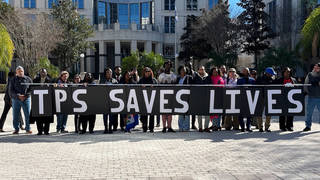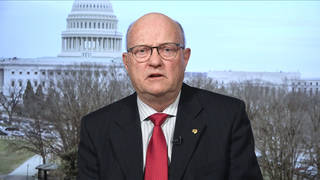
As Israeli warplanes continue to pummel Tehran and other parts of the country, President Trump has given mixed messages on whether the U.S. will join Israel’s war on Iran. Trump’s press secretary, Karoline Leavitt, delivered a message on Thursday that Trump will decide on direct U.S. involvement in the next two weeks. Leavitt delivered the message shortly after Trump met with his former adviser Steve Bannon, who has publicly warned against war with Iran. The U.S. is reportedly considering dropping “bunker buster” bombs on underground Iranian nuclear facilities. “It’s reminiscent of the beginning of the Iraq War, when they said it’s going to be a cakewalk,” says William Hartung, senior research fellow at the Quincy Institute for Responsible Statecraft.
A U.S.-based Iranian human rights group reports that the Israeli attacks have killed at least 639 people in Iran, while Iran’s retaliatory strikes in Israel have killed an estimated two dozen.
Transcript
AMY GOODMAN: Iran’s foreign minister, Abbas Araghchi, is set to hold talks with France, Germany and the United Kingdom today in Geneva as Israel’s attacks on Iran enter a second week. A U.S.-based Iranian human rights group reports the Israeli attacks have killed at least 639 people. Israeli warplanes have repeatedly pummeled Tehran and other parts of Iran. Iran has responded by continuing to launch missile strikes into Israel. Hundreds of thousands of Iranians protested today in Iran against Israel.
Meanwhile, President Trump continues to give mixed messages on whether the U.S. will join Israel’s attack on Iran. On Wednesday, Trump told reporters, quote, “I may do it, I may not do it,” unquote. On Thursday, White House Press Secretary Karoline Leavitt delivered a new statement from the president.
PRESS SECRETARY KAROLINE LEAVITT: Regarding the ongoing situation in Iran, I know there has been a lot of speculation amongst all of you in the media regarding the president’s decision-making and whether or not the United States will be directly involved. In light of that news, I have a message directly from the president. And I quote: “Based on the fact that there’s a substantial chance of negotiations that may or may not take place with Iran in the near future, I will make my decision whether or not to go within the next two weeks.”
AMY GOODMAN: President Trump has repeatedly used that term, “two weeks,” when being questioned about decisions in this term and his first term as president. Leavitt delivered the message shortly after President Trump met with his former adviser Steve Bannon, who’s publicly warned against war with Iran. Bannon recently said, quote, “We can’t do this again. We’ll tear the country apart. We can’t have another Iraq,” Bannon said.
This comes as Trump has reportedly sidelined National Intelligence Director Tulsi Gabbard from key discussions on Iran. In March, Gabbard told lawmakers the intelligence community, quote, “continues to assess that Iran is not building a nuclear weapon,” unquote. But on Tuesday, Trump dismissed her statement, saying, “I don’t care what she said.”
Earlier Thursday, an Iranian missile hit the main hospital in southern Israel in Beersheba. After the strike, Israeli Defense Minister Israel Katz threatened to assassinate Ayatollah Ali Khamenei Thursday, saying Iran’s supreme leader, quote, “cannot continue to exist,” unquote. Israeli Prime Minister Benjamin Netanyahu visited the hospital and likened Iran’s attack to the London Blitz. Netanyahu stunned many in Israel by saying, quote, “Each of us bears a personal cost. My family has not been exempt. This is the second time my son Avner has canceled a wedding due to missile threats,” unquote.
We’re joined now by William Hartung, senior research fellow at the Quincy Institute for Responsible Statecraft. His new piece for The National Interest is headlined “Don’t Get Dragged into a War with Iran.”
Can you talk about what’s going on right now, Bill, the whole question of whether the U.S. is going to use a bunker-buster bomb that has to be delivered by a B-2 bomber, which only the U.S. has?
WILLIAM HARTUNG: Yeah. I mean, this is a case of undue trust in technology. The U.S. is always getting in trouble when they think there’s this miracle solution. A lot of experts aren’t sure this would even work, or if it did, it would take multiple bombings. And, of course, Iran’s not going to sit on its hands. They’ll respond possibly by killing U.S. troops in the region. Then we’ll have escalation from there. It’s reminiscent of the beginning of the Iraq War, when they said, “It’s going to be a cakewalk. It’s not going to cost anything.” Couple trillion dollars, hundreds of thousands of casualties, many U.S. veterans coming home with PTSD, a regime that was sectarian that paved the way for ISIS — it couldn’t have gone worse. And so, you know, this is a different beginning, but the end is uncertain, and I don’t think we want to go there.
AMY GOODMAN: So, can you talk about the GBU-57, the bunker-buster bomb? And how is it that this discussion going on within the White House about the use of the bomb — and, of course, the U.S. has gone back and forth — I should say President Trump has gone back and forth whether he’s fully involved with this war, at first saying they knew about it, but Israel was doing it, then saying, “We have total control of the skies over Tehran,” saying “we,” not “Israel,” and what exactly it would mean if the U.S. dropped this bomb and the fleet that the U.S. is moving in?
WILLIAM HARTUNG: Yes, well, the notion is, you know, it’s heavy steel, it’s more explosive power than any conventional bomb. But it only goes so deep, and they don’t actually know how deep this facility is buried. And if it’s going in a straight line, and it’s to one side, it’s just not clear that it’s going to work. And, of course, if it does, Iran is going to rebuild. They’re going to go straight for a nuclear weapon. They’re not going to trust negotiations anymore.
So, apparently, the two weeks is partly because Trump’s getting conflicting reports from his own people about this. Now, if he had actual independent military folks, like Mark Milley in the first term, I think we’d be less likely to go in. But they made sure to have loyalists. I mean, Pete Hegseth is not a profile in courage. He’s not going to stand up to Trump on this. He might not even know the consequences. So, a lot of the press coverage is about this bomb, not about the consequences of an act of war.
AMY GOODMAN: Right, about using it. In your recent piece, you wrote, “Israeli officials … suggested … their attacks may result in regime change in Iran despite the devastating … destabilizing impact … such efforts in the region” would have. Can you talk about the significance of Israel putting forward and then Trump going back and forth on whether or not Ali Khamenei will be targeted?
WILLIAM HARTUNG: Yeah, I think my colleague Trita Parsi put it well. There’s been no example of regime change in the region that has come out with a better result. They don’t know what kind of regime will come in. Could be to the right of the current one. Could just be chaos that would fuel terrorism, and who knows what else. So, you know, they’re just taking — they’re winging it. They have no idea what they’re getting into. And I think Trump, he doesn’t want to seem like Netanyahu’s pulling him by the nose, so when he gets out in front of Trump, Trump then says, “Oh, that was my idea.” But it’s almost as if Benjamin Netanyahu is running U.S. foreign policy, and Trump is kind of following along.
AMY GOODMAN: I mean, you have Netanyahu back in 2002 saying, “Iran is imminently going to have a nuclear bomb.” That was more than two decades ago.
WILLIAM HARTUNG: Exactly. That’s just a cover for wanting to take out the regime. And he’s come, and he spoke to the U.S. Congress. He’s made presentations all over the world. And his intelligence has been proven wrong over and over and over. And when we had the Iran deal, he had European allies, he had China, he had Russia. There hadn’t been a deal like that where all these countries were on the same page in living memory, and it was working. And Trump trashed it and now has to start over.
AMY GOODMAN: So, talk about the War Powers Act. The Virginia Senator Kaine has said that — has just put forward a bill around saying it must be — Congress must vote on this. Where is Schumer? Where is Jeffries on this, the Democratic House and Senate leaders?
WILLIAM HARTUNG: Well, a lot of the so-called leaders are not leading. I mean, when is the moment that you shouldn’t step forward if we’re possibly going to get into another disastrous war? But I think they’re concerned about being viewed as critical of Israel. They don’t want to go out on a limb. So, you’ve got a progressive group that’s saying, you know, “This has to be authorized by Congress.” You’ve got Republicans who are doubtful, but don’t want to stand up to Trump because they don’t want to lose their jobs. Risk your job. I mean, this is a huge thing. You know, don’t just sort of be a time-server.
AMY GOODMAN: So, according to a report from IAEA, the International Atomic Energy Agency, released in May, Iran has accumulated roughly 120 kilograms of uranium enriched to 60%, which is 30% away from weapons-grade level of 90%. You have Rafael Grossi, the head of the IAEA, saying this week that they do not have evidence that Iran has the system for a nuclear bomb.
WILLIAM HARTUNG: Yes, well, a lot of the discussion points out — they don’t talk about, when you’ve got the uranium, you have to build the weapon, you have to make it work on a missile. It’s not you get the uranium, you have a weapon overnight. So, there’s time to deal with that, should they go forward through negotiations. And we had a deal that was working, which Trump threw aside in his first term.
AMY GOODMAN: Talk about the foreign minister of Iran, Araghchi, in Geneva right now speaking with his counterparts from Britain, France, the EU.
WILLIAM HARTUNG: Well, I don’t think U.S. allies in Europe want to go along with this, and I think he’s looking for some leverage over Trump. And, of course, Trump is very hard to read, but even his own base, majority of Trump supporters, don’t want to go to war. You’ve got people like Tucker Carlson, Steve Bannon saying it would be a disaster. But ultimately, it comes down to Trump. He’s unpredictable. He’s transactional. He’ll calculate what he thinks it’ll mean for him.
AMY GOODMAN: And what impact does protest have around the country, as we wrap up?
WILLIAM HARTUNG: Well, I think taking a stand is infectious. So many institutions were caving to Trump. And the more people stand up, 2,000 demonstrations around the country, the more the folks sitting on the fence, the millions of people who, they’re against Trump, but they don’t know what to do, the more of us that get involved, the better chance we have of turning this thing around. So, we should not let them discourage us. We need to build power to push back against all these horrible things.
AMY GOODMAN: Finally, if the U.S. were to bomb the nuclear site that it would require the bunker-buster bomb to hit below ground, underground, are we talking about nuclear fallout here?
WILLIAM HARTUNG: I think there would certainly be radiation that would, of course, affect the Iranian people. They’ve already had many civilian deaths. It’s not this kind of precise thing that’s only hitting military targets. And that, too, has to affect Iran’s view of this. I mean, they were shortly away from another negotiation. You know, now their country’s being devastated. So, can they trust us?
AMY GOODMAN: Bill Hartung is senior research fellow at the Quincy Institute for Responsible Statecraft. His new piece for The National Interest is headlined “Don’t Get Dragged into a War with Iran.” Go to democracynow.org; we’ll provide the link.
This is Democracy Now! When we come back, a major Supreme Court ruling. Stay with us.
[break]
AMY GOODMAN: “The Body Electric” by Alynda Segarra of Hurray for the Riff Raff, performing in our Democracy Now! studio.













Media Options